
Finding your unique style in music composition is a journey of self-discovery, experimentation, and refinement. Many aspiring composers and musicians struggle to define their sound, often overwhelmed by the vast musical landscape. However, developing a distinctive style isn’t about forcing originality—it’s about understanding your influences, honing your skills, and allowing your personality to shine through your music. Whether you’re a beginner or an experienced composer seeking to refine your identity, these strategies will help you carve out a sound that is unmistakably yours.
Explore and Analyze Your Influences
Every musician is shaped by the artists they admire: list composers, songwriters, and musicians who inspire you the most. Listen critically to their work, including their use of melody, harmony, rhythm, instrumentation, and arrangement. Ask yourself what draws you to their music—are you captivated by their harmonic choices, lyrical depth, or experimental structures?
Once you’ve identified these elements, go beyond passive listening. Break down their compositions, transcribe melodies, and analyze chord progressions. Understanding the techniques behind your favorite music will give you tools to develop your style rather than simply imitating others. Take inspiration, but always aim to reshape it in a way that feels authentic to you.
Experiment with Different Genres and Techniques
Versatility is key when searching for your musical identity. Exploring different genres can introduce you to new ideas you might not have encountered in your usual style. If you typically compose rock music, try experimenting with jazz, classical, or electronic elements. You don’t have to abandon your primary genre, but blending diverse influences can add depth and originality to your compositions.
Similarly, challenge yourself with various compositional techniques. Try composing a piece using only a specific scale, a unique time signature, or unconventional instrumentation. Restrictive exercises like these often lead to unexpected creative breakthroughs, helping you discover sounds that resonate with you.
Develop a Signature Sound
A recognizable style often stems from consistent melody, harmony, rhythm, and timbre choices. Pay attention to the recurring elements in your compositions—do you favor certain chord progressions, rhythmic patterns, or melodic contours? Over time, these preferences will start to define your signature sound.
Instrumentation and production also play a significant role in shaping your identity. Some musicians are known for their intricate orchestration, while others rely on raw, minimalist arrangements. Experiment with different sonic textures, effects, and mixing techniques to find a sound that feels uniquely yours.
Trust Your Instincts and Embrace Imperfections
Many artists fall into the trap of overanalyzing their work, constantly comparing themselves to others. While learning from great composers is valuable, avoid the temptation to mold your music entirely around external expectations. Trust your instincts and write what feels natural.
Imperfections and quirks in your music are what make it stand out. Some of the most celebrated artists have built their style on what others might consider limitations—a raw, unpolished vocal tone, an unconventional approach to harmony, or an unpredictable song structure. Instead of trying to eliminate these elements, embrace them. They are part of what makes your music distinct.
Establish a Routine and Keep Creating
Creativity thrives with consistency. Set aside dedicated time for composing, even if you don’t feel inspired. The more you write, the more refined your style will become. Not every piece needs to be a masterpiece—sometimes, simply finishing a composition is more important than perfecting it.
Keeping a musical journal or recording short ideas can help you track your progress and identify recurring themes in your work. Over time, you’ll notice patterns that define your style, allowing you to refine and develop them.
Get Feedback and Collaborate
Seeking feedback from trusted peers, mentors, or online communities can provide valuable insights into your musical identity. Other musicians can often recognize patterns you might not see yourself in your work. However, be mindful of whose opinions you take to heart. Constructive criticism is helpful, but ultimately, your style should reflect your artistic vision, not someone else’s preferences.
Collaborating with other musicians is another powerful way to expand your horizons. Working with artists from different backgrounds can challenge you to think differently and introduce fresh perspectives to your compositions.
Finding your unique style in music composition is not about forcing originality—it’s about understanding yourself as an artist. You can craft your music by analyzing your influences, experimenting with different genres, developing a signature sound, and trusting your instincts. Stay consistent, embrace imperfections, and let your personality shine through your work. Over time, your unique voice will emerge naturally, setting you apart in the ever-evolving world of music.